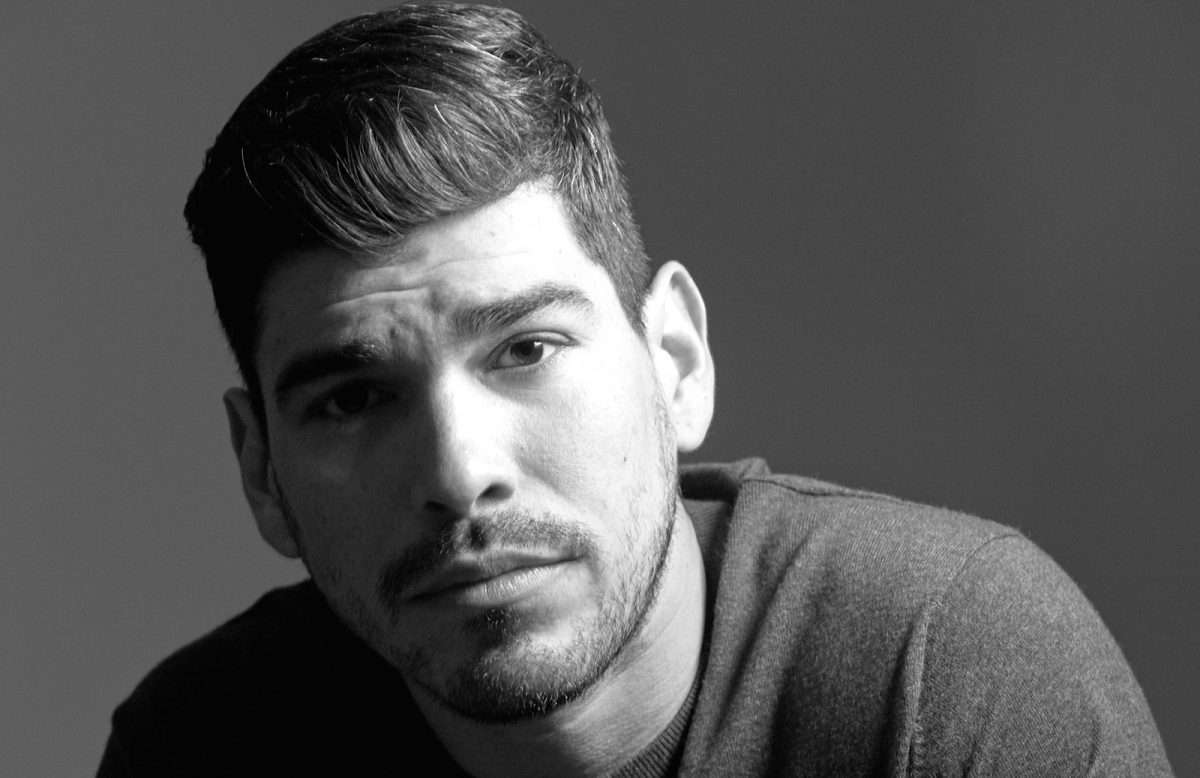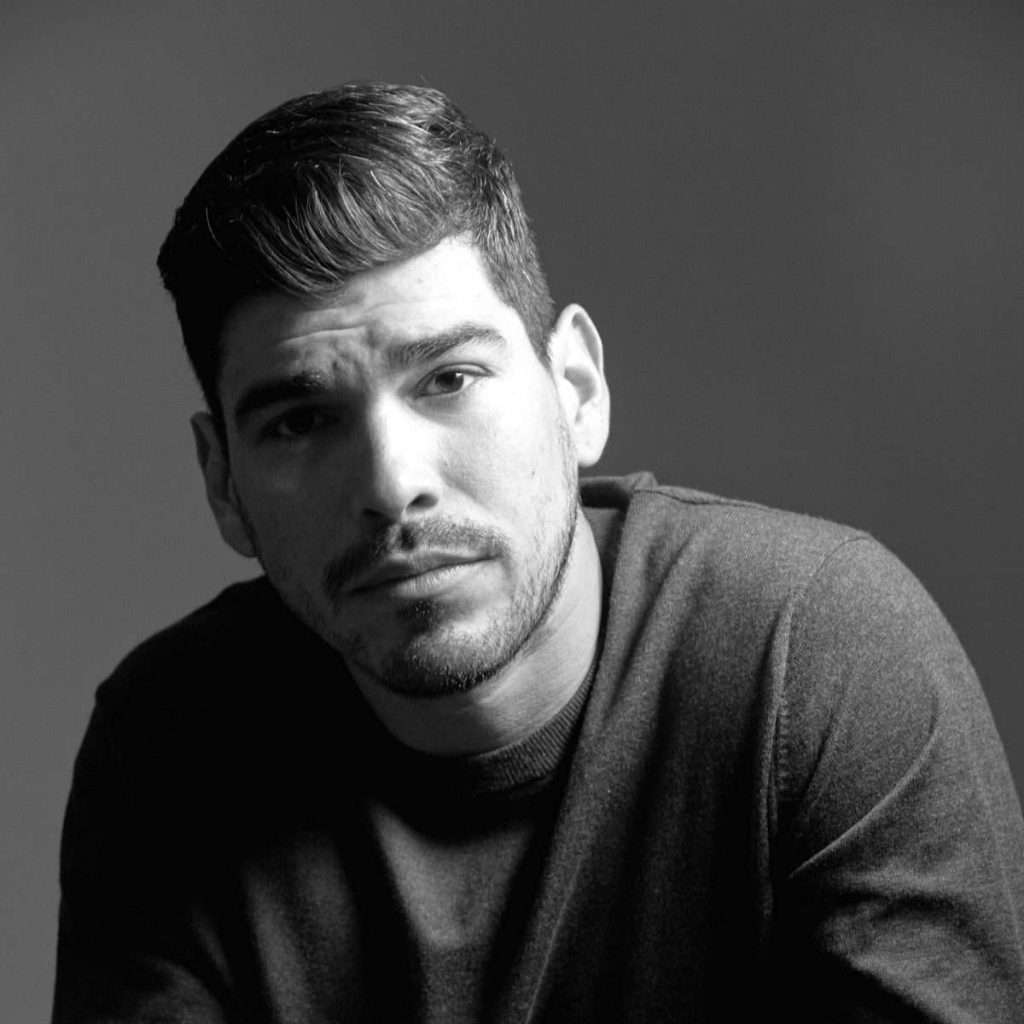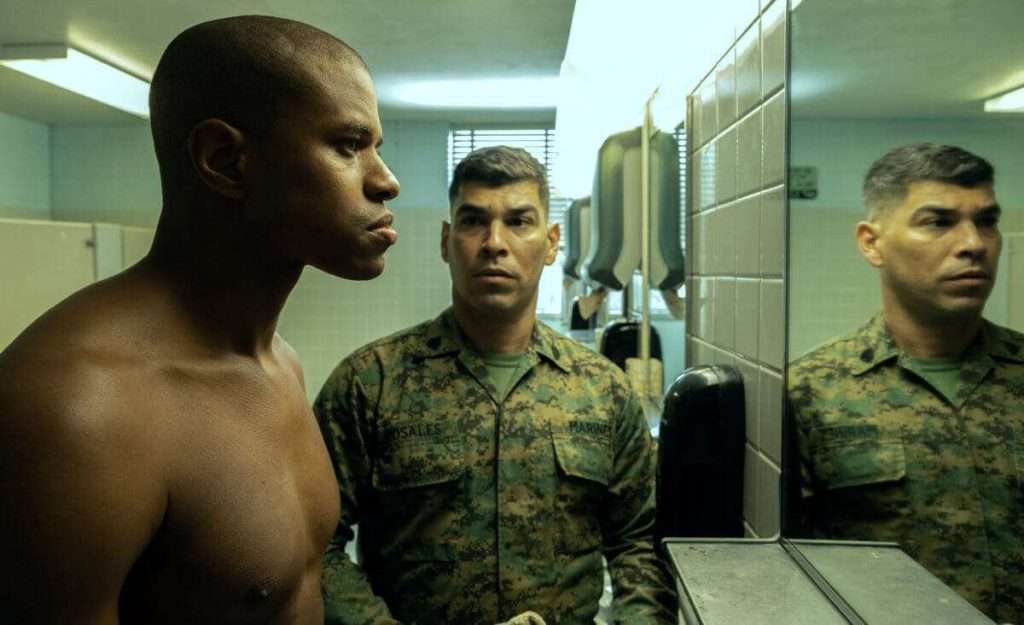

Deep voice, broad shoulders and a charming ruggedness to him — there’s a world where Raúl Castillo might be thrown in with the other archetypal alpha-male character actors of his generation, perhaps the likes of Jon Bernthal or Tom Hardy (who, make no mistake, are some of the most charismatic screen presences in the industry today). What I find, though, while watching him in any of his scene-stealing roles — be it a hot-headed father of three in indie-gem We The Animals, an overprotective fiancée in quirky coming-of-age comedy Cha Cha Smooth, or as a marine instructor in Elegance Bratton’s real life drama, The Inspection — is that he’s mastered the one-two punch of both engaging with and subsequently subverting an audience’s pre-conception of a character. Instead of a hot-headed father, you suddenly see the patriarch of a family crumbling under the burden of being the sole provider; in the place of the problematic fiancée is a man fiercely in love with his family.
During our brief conversation, he humbly gives most of that credit to the directors he works with— up-and-comers with fresh perspectives— or the depth of the material he’s given. Of course, to a degree, that’s true. Yet, the more we talk, the more I feel certain that he has as much to do with it as any of them. Whether it’s intentional or instinctual, Castillo’s magnetic affinity for on-screen introspection and refreshing disregard for a traditional portrayal of masculinity is quickly showing him to be one of Hollywood’s best kept secrets. But, after his latest terrific turn in The Inspection, something tells me that won’t be the case for long.

I watched We The Animals for the first time a few weeks ago. As a child of divorce with two older siblings, you can imagine how much it resonated. You’re a child of three also, right?
That’s right. Yeah, I’m a middle child.
Did you find that your family could identify with the characters?
Coming from a struggling family, I think we all identified with that — seeing your parents struggle to make ends meet. I think that resonated for my brother, my sister, and I, and the frustrations that that imposed on my parents as young parents. Definitely. I think a lot like the middle brother in a lot of ways.
Was that one of the reasons why you chose to pursue that role because you could see a bit of yourself in the middle brother?
The script was so strong but it was obviously coming from such great source material. The novel really resonated with me. The characters coming from this blue-collar background, but then the way that I think Justin Torres gave them humanity I thought was really interesting to me, and I thought that given the chance I could use something interesting with the character.
Watching The Inspection made me really interested in the roles that you choose. I’ve noticed from watching your movies that you’re constantly bringing this deep sensitivity to those types of characters and totally subverting my expectation of that alpha-male archetype, whether that be Rosales, or Joseph in Cha Cha Smooth or We the Animals. Is that intentional or instinctual on your part?
I think it has a lot to do with the directors that are attracted to my work. That’s a testament to Jeremiah Zagar and Cooper Raiff and Elegance Bratton. The three of them I think are the kind of directors that think outside of the box and are interested in telling more subversive depictions of masculinity. Those directors, they’re really interested in excavating the human condition in very unique ways. And the three of them were attracted to my work, so they came to me. We shared views about the work and about characters. The character of Paps in We the Animals could have easily been like this evil villain or this one-dimensional trope. But if you read the novel, Justin Torres, he’s very compassionate towards that character of Paps. And you can say that for Joseph in Cha Cha and Rosales [in The Inspection]. These are really compassionate depictions of these men and really layered. That’s all on the page, and my job as an actor is just to stay out of the way of the writing and bring my whole self to the role.
I know that, for a long time, you considered yourself a writer first. How much of your writing brain influences your acting brain during the process of filming?
[Laughs] Mostly in negative ways. Sometimes because as a writer, I know how things want to sound. I can hear the musicality when I’m reading a script. My constant challenge is to break out of the musicality and surprise myself. But that’s why it’s important to work with directors who are willing to push you and willing to drive you outside of your comfort zone.
Do you think that lack of classical training has been helpful to you in a way because you have more flexibility?
Yeah, especially with film work because I found that what I do in film, I’ve been doing since I was a kid — locking myself in my bedroom and playing with my action figures and creating imaginary scenarios, really getting lost in those worlds. I don’t know, maybe if I’d have gone to school and studied it, someone would have tainted that and messed with the formula too much. Doing press and publicity is kind of a new challenge for me, but getting lost in the story is something that I’ve been practicing since I was a boy.
I guess because you never really learnt the rules, so to speak, you’ve been able to just ignore them. Then there’s no ceiling. There’s no boundaries.
That’s actually something that I found fascinating in We the Animals, how this young boy gets lost in his imagination in his journals. I remember identifying with that because I spent a lot of time alone as a kid. I’m really close to my siblings, but we’re all very individual, and I would get lost in my own imagination.
Has being more involved in filmmaking in recent years ever made you think about writing and maybe directing a movie of your own?
Actually, I have a story that I’ve been wanting to tell for well over a decade now, and I’m finally zeroing in on it – I have a co-writer and we have an early draft. I would like to move into directing on the film side of things, I’d like to be in control of the stories that I’m putting out there. So, yeah, there’s a story that’s very near and dear to my heart that I hope to put out in the next couple of years.
Is it an autobiographical story?
No, no, it’s not autobiographical. It’s something that I heard from a family member — it’s a story that’s in the family but not necessarily anything happening to me directly. Even when I wrote plays, I never wrote autobiographical plays. I always picked things that I heard or observed. I’ve always been interested in stories that were outside of my own lived experience. I found my own lived experience quite boring.
What did you think was the biggest challenge for you taking on the role of Rosales in The Inspection?
Honoring a story that was so deeply personal to the director. Elegance brought so much of himself, so much vulnerability and so much care to this story that I think for the cast at large, it was really important to honor and put his story first at all times. But that’s a blessing. I think when everyone’s able to check their egos at the door and you have a story that everyone can get behind and protect, then you really have a real shot at creating something special, because filmmaking is already so difficult to begin with. It’s a miracle anything gets made, because it’s always a brutal process in my experience. But I think with Elegance, we all felt very protective of his story.

The character of Rosales is based on multiple people, were you able to meet any of the real-life characters that he was based on?
No one that Rosales was based on directly. We did have a military advisor by the name of Octavia Jones who served alongside Elegance as a marine and she’s currently a drill instructor. Bokeem Woodbine, Nick Logan and myself all worked with her before we started filming and all throughout. But also Elegance is just so open and available as an artist. He was so accessible. He was there from beginning to end obviously and always made himself available to us. We were lucky in that sense to have access to him.
Finding community is a huge theme in this film, but it’s interesting because Elegance asked you not to be a bit standoffish with recruits to get into character. How was it at the end of the shoot when you could finally let your guard down with them?
Yeah, it was funny because we all got together in New York for the film festival. That was the first time that we all came together as a cast and it was a collective sigh of relief just being able to celebrate the film.
But even when we were in Jackson shooting the film, toward the end there was some connection. I mean, Elegance and Chester, his producing partner and life partner, are really great at throwing barbecues. [Laughs] We were all in Jackson, Mississippi, sequestered at this Homewood Suites hotel and there’s not a lot to do, so toward the end, on the weekends, they would throw these amazing barbecues that gave us a good opportunity to create camaraderie.
You have a history of taking roles that are in some shape or form related to the queer experience. Do you have a closeness with the LGBTQ community that’s led you to take on roles like this do that community justice?
Not by design, but just because queer artists have always looked out for me and given space to me as an artist. I’ve never shied away from queer stories even before people were embracing it as they are right now. I came up in a time when people were very trepidatious of taking on gay roles, whether the actor was straight or gay There was a lot of caution around it.. But I was also really influenced by a lot of queer artists coming up, so it was very easy for me to accept the space when it was given to me. And I feel really lucky that I’ve been a part of these beautiful stories.
As someone who enjoys stepping out of the box, what challenges are you looking for over the next stage of your career?
I want to continue to surprise myself, so it’s hard to answer a question like that because I don’t know the answer to it until it’s standing right in front of me. I’d like to work with the Great directors. I’d love to work with more veteran directors. I’ve been working with a lot of first-time feature filmmakers, which I love and I’ll continue to do, but I hope I’ll get to work with some of the directors whose careers I’ve admired over the years. I will say that one film that really blew me away this year was Everything Everywhere All at Once, so I’m very interested in doing something with The Daniels, and I love filmmakers like Lynne Ramsay and Kelly Reichardt too. The list goes on.
Did you have any mentors growing up that inspired your approach to Rosales in The Inspection?
I went to college straight out of high school as an undergrad at Boston University. I grew up in McAllen, Texas. First-generation Mexican American. I was the first in my family to go off to college and certainly the first to study something in the arts. Being in a city like Boston was quite a culture shock, and because of that I ended up having a lot of discipline problems my freshman year. I had a tough go at it because I felt like a fish out of water, and the way that I dealt with that was by acting out because I felt insecure and I masked my insecurity with bravado. But there was an African-American professor by the name of James Bruhl who was the only person of color in that faculty — he took me under his wing and figuratively slapped me around when I needed it, and taught me a lot about acting. More importantly, he taught me a lot about what it is to be a man of color in this country. I think he understood that I needed some perspective and some context, having come out of a very homogenous environment, growing up on the border like I did, from a family that didn’t come from a lot of money, then going to a city like Boston, to a private university.
He came to see through all the veneer that I put up, and gave me compassion when I needed it. He gave me space, and he saw me. He really truly saw me and saw the value that I could bring to that programme. I don’t think I would’ve made it through that experience If I didn’t have that guidance. So it resonated with me, this notion of people of color looking out for each other in American institutions and giving each other a leg up when we need it.



